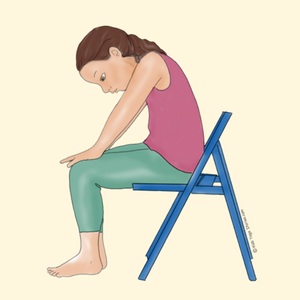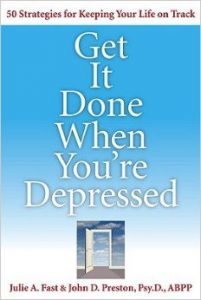Julie A. Fast's Blog, page 23
July 18, 2018
Why Men with Bipolar Need Different Treatment than Women

Men and women are different. I call it the male/female continuum. All of my coaching clients know this topic well. We can’t treat men with bipolar the same way we treat women. I have posted an article below that has NOTHING to do with bipolar, but it has everything to do with how men think and what they like.
Of course, there will always be a few who are different, but after 8 years of coaching men and coaching women, I want to celebrate our differences.
Men need activity. Men need their male bonding. Men need THINGS. Men don’t talk as much. Men do sports to communicate. Men like to be with other men in large groups.
When looking for help for a MAN with bipolar, don’t expect them to respond in the way women do. Find blogs and books and websites that are for MEN.
The man in this picture is Jens Voight. He does not have bipolar. He is a guy and the article linked below is such a perfect example of how men think. Let’s learn from men and come up with a management plan that works for how they think.
Read this article and revel in the very maleness of it all. We need to celebrate men. If you are a man with bipolar and the ultra talkative approach to managing mental health is not working for you, think of what you need. What makes you happy? What works for you and then find a health care professional who can help.
Straight or gay- non binary or super DUDE, men are different from women and need special bipolar treatment.
Julie
July 13, 2018
Online Workshop: Get the Diagnosis Right with Julie A. Fast

What’s new? An online workshop with best-selling author, coach and mental health continuing education trainer Julie A. Fast for parents, partners and health care professionals on how to get a correct diagnosis for a loved one or client. Julie will teach you how to efficiently document and share symptoms with psychiatric health care professionals to get treatment started and continued for a loved one or client.
After this 90 minute workshop, you will have a clear picture on what direction to take in oder to find the RIGHT help for a loved one. Julie covers the following in the workshop:
1) Bipolar disorder symptoms and types.
2) How bipolar differs from anxiety, psychotic and personality disorders.
3) The role psychosis plays in bipolar.
4) The symptoms of schizoaffective disorder.
5) The symptoms of schizophrenia that differ from bipolar.
6) The role cannabis plays in a diagnosis.
7) How to correctly report symptoms to health care professionals.
8) Why a precise diagnosis matters and what you can do to help a loved one or client get the right treatment.
This class is part one of a five part series on how to get a loved one into professional, compassionate and effective treatment. Julie will also explain how you can use her Health Cards and the strategies in Loving Someone with Bipolar Disorder and Take Charge of Bipolar Disorder to talk about symptom management with a loved one.
The Get the Diagnosis Right workshop includes homework to help you prepare for the session and a lively Q&A discussion during the workshop with Julie where you can ask about your specific situation. This class is usually the first appointment Julie has with private clients. The cost of the class is a 60% savings over Julie’s regular fees.
Cost: $55
Click on the date that works for you to register and reserve your spot. This is the same class with three different times. You do not need to register for three classes. Class size is limited. Please note the times carefully. They are listed in PST and EST. Please adjust for your time zone when choosing your workshop.
Saturday, July 21st 9:00- 10:30 AM PST (Noon- 1:30 PM EST)
Sunday, July 29th 4:00 – 5:30 PM PST (7:00- 8:30 PM EST)
The class is held online at Zoom.com with a live video feed where Julie shares her knowledge and then answers questions from the audience about specific situations. After registering, you will receive an email from Julie with the homework and all of the sign in information needed in order to participate in the workshop. Please note- this is an online workshop where Julie will be live own video. She will show slides and talk about the topics as you follow along and participate when Julie asks for input. This is interactive and requires a computer or smart phone.
A note from Julie: I was trained by one of the best diagnostic minds in the world, in my opinion! my coauthor Dr. John Preston. Over the past 16 years he has taught me the questions to ask and the information health care professionals need in order to find a diagnosis that helps a person find helpful treatment. John and I both see the diagnosis as a tool for finding stability. It isn’t a label or a curse. It’s simply a tool. I then took John’s teachings and applied them to my one on one coaching over the past ten years. After working with thousands of parents, partners and health care professionals, I came up with a system that I now use with all of my individual clients. I can no longer keep up with the one on one demand, so the group classes are now ready to shine!
If you are unfamiliar with my work, I’m the author of Loving Someone with Bipolar Disorder: Understanding and Helping Your Partner, Take Charge of Bipolar Disorder, Get it Done When You’re Depressed and more. I’m a columnist and blogger for BP Magazine, a bipolar and mental health specialist for the Sharecare.com website and a blogger for Psychology Today. I am CEU (continuing education) certified and have trained health care professionals for over 15 years on various mental health topics. My work does not replace the work of health care professionals in any way. I am a part of a team that helps a person with mental health symptoms find the right care.
Getting a correct diagnosis for a loved one or client is life changing. It repairs families, offers hope, improves a professional practice, prevents encounters with law enforcement and ensures a stable and hopeful future for everyone.
July 11, 2018
Screw it All! Bipolar and Feeling Awful

Screw it all…. a dangerous mood swing that I can’t let into my life.
I write about this in my first book Bipolar Happens!
I sometimes have a mood swing that tells me to SCREW IT ALL! It’s an aggressive and very physical feeling that makes me want to propel my body across a room and run into something. I feel very uncomfortable physically and my brain is very unsettled. The only word we have for it is dysphoric mania, but it’s not really mania as I am actually tired. Maybe we could call it…
NEGATIVE BODY ENERGY AFFECT
Here is how I deal with it.
I don’t listen to my brain when it says SCREW IT ALL. That is not how I feel. I like life and I want to have a good life.
I sleep.
I take my lithium orotate.
Do you get this restless- upset- physically uncomfortable feeling?
Julie
July 10, 2018
Bipolar Disorder Management Realities… ARG!

Bipolar Disorder Mangement Realities…..
1. It is 24 hours. No one wants to hear this. There is no such thing as one time bipolar disorder management. It’s daily.
2. Triggers come from change. They are not positive or negative. Getting married can trigger as much bipolar as a death.
3. Medications are about 50% of any plan. Many of us can’t tolerate full medication regimes.
4. Stability is NOT possible within an abusive relationship.
5. If you hang out with unstable people, there is a good chance it will rub off on you and create mood swings.
6. If you are willing to make sacrifices, you can find stability and happiness. Doing what you want without consideration for bipolar will not create stability.
7. Hanging out with stable people is a really amazing experience that teaches us how to live a stable life.
I choose health. I’m learning what I want and need in life. We can get better and we can find happiness, love and financial stability. It takes a plan and it takes time, but we can do it.
Julie
July 9, 2018
How I Stop My Bipolar Manic Spending
I made a promise to myself that I would not allow #bipolar #mania to take over my life. I spent 20 years chasing euphoric mania and it never did an ounce of good overall. Today, I choose to fight my mania. It is not my friend. It is not happiness.
Euphoric mania lies to me. It wants to gamble, shop, sleep with hot guys, travel and go crazy. Not in my body!
Here is an interview I did with a Reuter’s author who wanted to explore the spending symptoms we have with mania.
YOUR MONEY-When bipolar disorder leads to extreme shopping
Julie
PS: I am putting this video up even though I’ve been sick and look like a warmed up TV dinner. It’s important that we share when we are not feeling well.
July 7, 2018
Parent of a Teen or Adult Child with Bipolar Disorder?

I want to teach parents to recognize the true potential of a child that still fits within the very real challenges of bipolar. For example, I, the Julie who is intelligent and very educated and very, very good at what she does in terms of marketing and writing could easily GET a job at NIKE. But I, the Julie who has bipolar, would be sick within a month of working in the stimulating, go, go, go environment of Nike.
Does this mean I can’t do my marking? No. It means I will never be able to do it at a big company. Does this upset me? Of course it does. It’s devastating and I will always be upset by it, but I no longer fight it. I work within my ability and I work within MY STABILITY.
I might want to do all of the difficult poses in yoga for example, but depending on where I am in life, I might have to modify my yoga practice. I may do my yoga from a chair. It’s the same with bipolar.
If you are a parent of a child with bipolar or schizoaffective, please join me in my closed group The Stable Table. I talk more about my work and how you can use my books and experiences to help a child with bipolar THRIVE.
Julie
July 6, 2018
Bp Magazine: Love Dogs? Why Owning a Pet Might NOT Be the Right Choice

I love dogs, but don’t own a dog. There is a lot of talk about how great therapy dogs can be… but there is another side to the story…. Here is my article on the topic from Bp Magazine.
Why Owning a Pet Might NOT Be the Right Choice
Volunteering at an animal shelter or visiting a family member’s pet are other ways you can experience the mental/physical health benefits dogs offer.
Thanks to everyone who leaves comment under the blogs. I do read them and I learn from them. One in particular stood out. It was a comment on a blog about therapy pets such as having a dog for anxiety. The comment noted that pets are a lot of work and are NOT always the best choice for those of us with bipolar disorder.
I 100 percent agree. I do have a dog in my life, but it’s my mother’s dog and there is simply no way I could take care of this wonderful animal on my own. I tried to have a puppy once and within two nights of having to wake up to take the little cutie out to the bathroom, I realized it would never work with my bipolar. The little guy soon had a more suitable home.
Click here to read the rest of the Why Owning a Pet Might NOT Be the Right Choice from Bp Magazine.

July 5, 2018
Tips for Getting Things Done When You’re Depressed

Tips for #GettingThingsDone when you’re depressed. #Bipolar is an illness that doesn’t care if a trigger is a positive or a negative. We can have mood swings from good news in the same way we get sick from bad news.
This is a picture of me holding a sample chapter for my next book. I look AWFUL. I know. It’s from stress. I wish work were easier, but it’s not. It is ok that we get sick while working. We just keep going. It takes more time. It is not fair and it’s not fun. But if we have goals, it is our reality. I want you to get things done!
It is hard to set goals, reach them and then get sick. If you have clients with bipolar, it helps to talk about this as it confuses us greatly.
How can we get sick from happy news such as getting a book deal?
Because bipolar is triggered by change and change is often positive.
I get things done by being realistic about this rotten illness. It makes me sick to succeed. I just have to work through it.
You can do the same.
I wrote Get it Done When You’re Depressed while I was depressed and writing a book. I know. Ironic! It really helps.
Julie

Watch out for Summer Mania

I have already had TWO hypomanic episodes this summer. But, the depression is here as well. It depends on if we have rapid cycling… I hope that we can find stability. I used to go absolutely wild in the summer due to this mania. I am now much more aware and able to stay away from the bars and the men. Is life less exciting? Well, it’s safer- what I considered exciting was actually very dangerous. So, life is still exciting, it is just SAFE at the same time. Good luck! Julie
Here is an article I wrote for Bp Magazine….

Watch Out for Summer Mania
Summer’s sunshine is a notorious trigger for mania. To prevent summertime mania, keep taking your medication—even when it feels like you don’t need to.
Preventing mania takes a lot of self-awareness, especially in summer when it’s so nice to feel good again. Have you ever noticed that your mood is better in the summer? This makes sense when you consider that mood swings often run in cycles, depending on the natural light where you live.
“For many people who have bipolar disorder, too much light exposure can provoke mania and too little can lead to depression,” says John Preston, MD, coauthor of our book and psychopharmacology expert in the treatment of bipolar disorder who teaches at Alliant International University, Sacramento Campus. “This is why hospitalizations for mania peak in the summer, and for depression [they peak] in the late fall.
“It’s certainly tempting to spend more time outside in the summer, so one must make a focused effort to keep bright light exposure at about the same amount of time per day, year round,” adds Dr. Preston. “What matters is the amount of bright light entering the eye, which has been shown to have a significant impact on brain chemistry…so sunglasses help.”
Even though it helps to read a reasonable explanation about why we often get manic in the summer, it’s still hard to take it seriously. After all, summer feels so good. However, this good feeling is often the result of mania and therefore has to be monitored carefully. Mania is so tricky—it can sneak up on you in just a few hours. Before you know it, you’re staying up all night for a week (at the expense Follow Julie Fast’s Blogof your job and relationships), working on a project you just know will change the world. Meanwhile, everyone around you is asking, “What the heck is wrong with you? Have you lost your mind?”
There are two types of mania, depending on whether you have bipolar one or bipolar two. The basic difference between the two diagnoses is that people with bipolar I experience full-blown mania, while those with bipolar II experience hypomania. If not detected early, full-blown mania gets out of hand very quickly and often requires hospitalization. Hypomanic mood swings, on the other hand, can go undetected for years, which is why people with bipolar II are often diagnosed much later in life than are those with bipolar I.
The number one sign of full-blown mania is when you sleep a lot less, but have plenty of energy. It’s especially important that you look for mania symptoms if you have a winter depression that suddenly lifts once there is more light outdoors. People with hypomania have more difficulty recognizing the signs they’re manic than do those with full-blown mania. Rapid speech and over socializing are often signs of hypomania. The more you know about your particular form of mania, the easier it will be to notice the first signs that you need help. I know: It stinks to have to get help when you’re finally feeling good again, but mania is simply the flip side of depression and needs to be treated just as aggressively.
The best defense against summer mania is prevention. This, of course, starts with medications. But as you may already know, while medications are invaluable at preventing the large mood swings, many people with bipolar disorder still have to deal with the smaller manias that slip through the medications and create disasters. There is also the problem of going off medications because you start to feel good and your brain tells you you’re not really sick anymore. This is really easy to do when it’s so nice and sunny outside. You often feel so much better and you think: It’s finally over! No more bipolar disorder for me! I’m cured!
And yet, just as depression creates false feelings of despair and hopelessness, mania creates the false feelings that we are fine and no longer need medications. The treatment window for mania is much less than that for depression, which is why mania must be prevented, instead of merely treated when it happens to show up. If you have even one thought that you “don’t really need those medications any more,” this is a time to talk with your doctor.
I don’t know about you, but I find it a real burden to have to look for mania every time I start to feel good. It’s the reality of this disorder however, and I’ve found there are certain things I say, think, and do every single time I begin to get manic. By learning these signs, writing them down, and then teaching my friends and family to recognize them as well, I’ve finally gotten more control over my mania. You can do the same. Here is a short version of my list:
What I say:
Do you think I’m manic?
I don’t think I’m manic!
This weather is so fantastic!
I am so happy to finally feel better!
I’m not manic. I’m just not depressed.
Leave me alone! You just want to ruin my fun!
I’m normal! This is the real me!
What I think:
Am I finally better?
Is this the real me?
Was the diagnosis wrong?
What I do:
Go out every night.
Drink a lot more.
Talk a lot faster.
Join groups or take classes.
Meet new people like crazy.
Stop eating good food, or hardly eat at all. Sleep less.
I always try to evaluate myself as soon as I have the first thought that I might be manic. You can do the same.
Ask yourself the following questions: Have I stopped my medications because I feel better? Have I conveniently decided not to tell anyone about doing this? Am I sleeping a lot less than normal and not feeling tired at all? Am I more irritated with people than usual? Am I using drugs or alcohol without thinking of what they’re doing to my brain? Was I depressed in the winter and now feel a lot better? Are things getting done really easily? Have I stopped eating or taking care of the people in my life? Have I become selfish? Has anyone expressed concern about my behavior? If you answer yes to any one of these questions, it may be time to talk with your doctor about mania.
I’ve had too many summer manic disasters and they took a lot of recovery time. I don’t want to go through it again this summer. If you’re well enough to read this article and see mild signs of mania, you have time to prevent a serious mood swing that could land you in the hospital, or cause you to make decisions you will regret. Do now what it takes to protect yourself, your family, your finances, and your life. You will thank me (and especially yourself) when the next winter comes around.
* * * * *
Watch out for these summer mania triggers
Extra sunshine (such as staying at a park or beach all day)
Weddings (including your own)
Any travel at all, especially to a new time zone
Graduation (for yourself or your children)
Visitors to your home
July 4 (this is often a boisterous, all-day event with a lot of stimulation)
Summer activities such as water sports or baseball
Summer break from school
* * * * *
Printed as “Watch Out for Summer Mania”
Take Charge of Bipolar Disorder has a great plan for managing mood swings no matter what the season.
June 9, 2018
Bipolar and Turning off the Negative Media to Focus on Self

I greatly believe in our ability to transform. We were not dealt a great hand when it comes to mental health. #Bipolar is difficult. I find it very hard to manage most of my days, but I do it and you can do it.
If the news upsets you, it is possible to turn it off.
If you want to stay alive and not go down a suicidal spiral, you can focus on your life and not the lives of others. We will never know about the lives of others, but we can become incredible experts on ourselves. What a joyful thought!
If someone else dies, it is not a sign you need to die. It is sign you can keep going with what is working. You are strong.
Change starts with me. In my body and within my mind. If I am not happy with how I look, only I can change this. If I want a mind free from chaos, it is up to me to seek help.

Let’s focus on a positive approach. Bipolar sucks, but I am going to do all I can to manage it.
Having an ill brain wears me out, so I am going to surround myself with people who are fun and kind and uncomplicated.
I feel upset and worried for no reason much of the time. I can put this in my journal so that I don’t take it out on others.

FREEDOM. Freedom from a racing mind. Freedom from unhappy relationships. Freedom from being upset and worried and depressed. That is my goal.
I have freedom from mania. Now, I want freedom from unhappiness.
We are so powerful. I will now practice what I teach and turn off all media, including Facebook until I am done with my most recent project. I know we are strong. We create our beautiful lives.
Julie

Julie A. Fast's Blog
- Julie A. Fast's profile
- 67 followers



